Detroit Travel Guide
The sprawling industrial city of Detroit, one of the oldest cities in America's Midwest, began life as a trading post when French explorer Antoine de la Mothe Cadillac landed on the banks of the Detroit River in 1701 and established a fort. He was later removed because of bad conduct, but unlike its outpost commander, the settlement of Detroit was flourishing. In 1796 Detroit officially became American, and by the early 19th century had already earned a reputation as a centre for the manufacturing industry, particularly kitchen ranges. As most people now know, however, Detroit did not go on to become the stove-making capital of the world. The city is renowned as the automotive centre of the globe, birthplace of the motorcar and home to some of the nation's top brands. Originally automobile empires were established by Detroit families such as Ford, Olds, Chevrolet and Dodge, which have become household names, thanks to the invention and perfection of the motor vehicle production assembly line, which began in Detroit.
It is not only hard work and industrial enterprise that drives Detroit, however. The city in southeast Michigan is also famous for the Motown record label, founded by former autoworker Berry Gordy Jr, which has introduced the world to stars such as Stevie Wonder, Michael Jackson, the Temptations and Diana Ross, to name but a few.
Modern 'Motown' Detroit is a little decayed and shabby, having suffered a decline in fortunes, but efforts are being made to increase the city's appeal as a tourist destination, and there are several attractions worth seeing. In the downtown area new hotels and restaurants are appearing to complement the sports stadium, and there is a focus on the arts, particularly in the city's historic theatre district. The Renaissance Center, a group of seven interconnected skyscrapers, provides the best views of downtown Detroit.
Things to do in Detroit
Sport, the history of the automobile, the distinctive Motown sound, and a rather unique downtown riverfront, are some of the reasons why people choose to holiday in Detroit, the bustling major metropolis of the state of Michigan. Motor City has fallen on rather hard times, but efforts are being made to revitalise the great city as a tourist destination.
Travellers visit Detroit to appreciate the birthplace of the automotive industry, to catch a show in the renowned Woodward Avenue theatre district, to experience the vibrancy of the Motown legend, to watch a game at the Comerica Park Stadium, to eat, drink and be merry in Greektown, but also to tick a major box in your exploration of the great cities of the US, and to see one of the most powerful industrial centres in the world. Detroit may have become something of a symbol of urban decay in the US, but even this dilapidation is fascinating to some visitors, with photographers lured by the street art and the greenery that has overgrown parts of the city.
Hordes of visitors descend on Detroit for the North American International Auto Show, held each January. However, for anyone who isn't car obsessed or employed in the industry, it is more pleasant to visit the city in the summer months, between June and August.
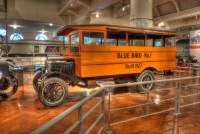
The Henry Ford Museum
Henry Ford, the son of a farmer, built his first car in Detroit in 1896. There was nothing too amazing about this feat, as cars had been around for some time. What was unique to Ford's invention was the moving assembly line, which enabled him to literally put the world on wheels. Henry Ford's legacy is found at every turn in his hometown, Detroit, so it is unsurprising that the city's most popular and prominent tourist attraction was founded by him in 1929. The Henry Ford Museum is spread over more than 36 hectares (90 acres) in Dearborn, just outside of metro-Detroit, and encompasses five different venues. Together they bring the whole American experience to life, using exhibits, demonstrations, programmes, and re-enactments to showcase American life and its people. Ford amassed most of the exhibit collection, including tens of thousands of ordinary objects, items associated with illustrious Americans, and numerous inventions documenting technological advances. Among the exhibits is the limousine in which John F. Kennedy was assassinated, Edgar Allan Poe's writing desk, and George Washington's camp bed. For lovers of Americana this attraction is a joy.
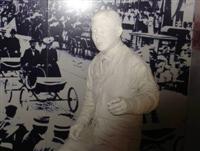
Automotive Hall of Fame
Car buffs the world over are drawn to Detroit's Automotive Hall of Fame, close to the Henry Ford Museum in Oakwood Boulevard, Dearborn, which is the public programme and exhibition centre for the worldwide motor vehicle industry. The venue features entertaining and enlightening exhibits about the people who drive the industry. Visitors can indulge in interactive events such as designing their own car and taking part in safety demonstrations. Even those who do not consider themselves petrol heads should enjoy a visit to this attraction; one can hardly explore Detroit without gaining some insight into the car manufacturing industry upon which the city was built.

Detroit Historical Museum
The Detroit Historical Museum, in downtown Detroit, allows visitors the chance to tour the scope of the city's history, from Antoine de la Mothe Cadillac's landing on the banks of the Detroit River through to the city's emergence as an industrial capital. In the museum it is possible to walk through the streets of Old Detroit and explore 19th-century shops. Visitors can also find out about Detroit's role in the Underground Railroad that helped slaves escape from the South. The interactive Glancy Trains toy train exhibit delights young and old. The museum is an interesting time travel exercise and provides a good general overview of the city's history, with some fascinating exhibits.
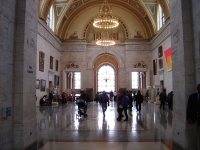
Detroit Institute of Arts
One of America's largest fine arts museums, the Detroit Institute of Art boasts more than 100 galleries, displaying a collection of about 65,000 works, ranging from mummies to Matisse, and Asian antiquities to American Impressionists. The Institute of Arts is conveniently situated in downtown Detroit, along with many of the city's top attractions. The highlights of the permanent exhibition include masterpieces by Rembrandt, Rubens, Bureghel the Elder, Botticelli, Van Gogh, Cézanne, Picasso, and Caravaggio. From January till May the Film Theatre screens an impressive selection of international films and shorts, and the museum hosts regular temporary exhibitions and special events.
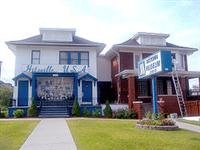
Motown Historical Museum
Detroit's famous Motown sound originated in two simple buildings on West Grand Boulevard, downtown, at Hitsville U.S.A. Visitors can see the original control room and recording studio where stars such as the Jackson Five, Diana Ross, and Stevie Wonder made hit records between 1959 and 1972. The museum also contains some costumes worn by the stars and Motown founder Berry Gordy's apartment, still as it was in the 1960s. This attraction is great fun for music fanatics, particularly lovers of this particular genre, and captures the spirit of the period in Detroit very well.
Ludington
Michigan boasts some wonderful sandy beaches on its western coastline, winding along Lake Michigan. Some of the best of these, with miles of sand and wild dunes, are near the ferry port town of Ludington. The Ludington State Park offers 14 miles (23km) of hiking and biking trails in beautiful virgin forests and dunes, miles of sandy beach, and three campgrounds. There are several other popular beach resort towns along Michigan's west coast, within easy reach of Detroit, which are known collectively as 'The Riviera of the Midwest'. Silver Lake resort boasts its world-renowned living sand-dunes and what is known fondly as the world's smallest newspaper. Grand Haven has a magnificent boardwalk along its spectacular beaches lined with restaurants, marina facilities and shops. Holland, as one might expect, has a Dutch flavour inherited from its founder, a Dutch clergyman. St Joseph, in the south, has a famous lighthouse and a French fort to explore.
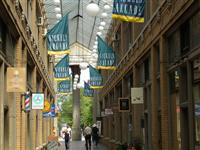
Ann Arbor
The city of Ann Arbor in southeast Michigan, 45 miles (72km) west of Detroit and just north of the Ohio border, is home to the University of Michigan, one of the country's top universities. The city and surroundings have a great deal to offer visitors in the form of historic and cultural attractions. Ann Arbor's downtown area is extremely vibrant with never a dull moment, from live music shows to a plethora of libraries, galleries and museums, restaurants offering everything from romantic dinners to cafe society, some of the country's best bookstores, and often a street party. Among the many museums of interest is the Ann Arbor Hands-On Museum, housed in a 100-year-old firehouse, which features more than 250 interactive science and technology exhibits. There are numerous restored 19th-century houses and farms to visit for a taste of life in days of yore, and even an original old main street blacksmith shop still operating in the satellite town of Manchester. Museums in the area cover everything from geology to classic cars, early American manuscripts, dentistry, and old fire-fighting equipment. On the university campus, the Natural History Museum contains the state's largest collection of dinosaur fossils and a planetarium features a 360-degree domed screen offering weekend stargazing shows.
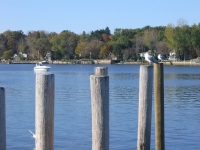
Saugatuck-Douglas
The small resort towns of Saugatuck and Douglas are close enough together to be considered one holiday destination. Popular for weekend getaways from Detroit and Chicago, the towns are located along the shore of Lake Michigan, in the southwest of the state. The area is known for its eclectic and artistic feel, with dozens of art galleries and plenty of good restaurants and bars. Saugatuck-Douglas offers a number of activities for visitors, including fishing, hiking, sailing, golf, bowling, horseback riding, kayaking, dune buggy outings, and lake cruises. There are also some small sandy beaches that offer scenic spots for swimming and sunbathing.
Getting Around
There is not much in the way of public transport in Detroit, and the Motor City is still geared resolutely towards the car. Driving is not too challenging and parking is relatively easy to find, but rush hours should be avoided. To hire a car drivers must be 21 years old and have a valid driver's license; sometimes an International Driving Permit is also required. However, should one choose to rely on public transport, the People Mover is an elevated monorail that provides a quick and easy way to get around most of the downtown area, while DDOT buses operate a meagre inner-city service and the SMART buses serve the suburbs, but service is sparse on weekends. Taxis are a convenient form of transport and can easily be found or ordered by phone. Rideshare services include Lyft and Uber.
Detroit Climate and Weather
Detroit has a humid continental climate with warm, humid summers and very cold winters. Mid-summer average temperatures can rise as high as 83F (28C), while in the coldest month, January, the mercury usually stays well below freezing point. Rainfall is spread fairly evenly over the year, with a few inches being recorded each month. Snow usually falls between November and April.
United States of America travel info
Electricity
The electrical current is 120 volts, 60Hz. Plugs are mainly the type with two flat pins, though three-pin plugs (two flat parallel pins and a rounded pin) are also widely used. European appliances without dual-voltage capabilities will require an adapter.
Language
English is the most common language spoken but Spanish is often heard in the south-western states.
Money
The official currency is the US Dollar (USD), which is divided into 100 cents. Only major banks exchange foreign currency. ATMs are widespread and credit cards are widely accepted; Apple Pay and Google Pay are very popular. Banking hours are Monday to Friday 9am to 3pm.
Tipping
A 15 percent tip is expected by taxi drivers, bartenders, hairdressers and waiters, but travellers shouldn't tip in fast-food or self-service restaurants. In expensive restaurants or for large parties, the tip should be 20 percent of the bill. It's normal to tip staff such as valets and porters in hotels; this is discretionary, although a minimum of $5 is expected. Most services are customarily tipped if the service is good.
Health
There are no specific health risks associated with travel within the USA. Medical facilities are excellent, but expensive. Only emergencies are treated without prior payment and treatment can be refused without evidence of insurance or proof of funds. Good medical insurance is essential.
Safety
Travel within the United States is generally trouble-free, though travellers should be aware that the US shares with the rest of the world an increased threat from terrorist incidents. Security has been heightened, particularly at airports. Restrictions on hand luggage apply and travellers are advised to check on the latest situation with airlines in advance. Travellers should also be alert to the dangers of car and street crime in cities and should use common sense and take basic precautions. Hurricanes are common between June and November, putting the southern USA, including the Gulf Coast and the eastern US at risk. There's a risk of wildfires in many dry areas in the US, particularly on the West Coast from March to November.
Local customs
Laws vary from state to state, including speed limit, fines and punishment. The age at which alcohol may be legally bought and consumed is 21 years.
Doing business
In such a large country, filled with so many diverse groups, business practices may differ according to each state, though rarely to any large degree. The East Coast is traditionally more formal than the West Coast, though in states such as California, dress code and conservative appearance are as common as they would be in New York. Punctuality is important throughout the country and it's considered rude to be late for a meeting. Gift-giving is uncommon as it may be construed as bribery. Appropriate titles (Mr, Mrs, Ms) are used upon introduction and until otherwise stated. Americans favour politeness and greetings of 'Hello' and 'How are you?' are often expressed with sincerity. Business hours may vary in each state, but an 8am start and 5pm finish Monday to Friday is the most common with an hour over lunch.
Status and age are not necessarily indicative of seniority, nor do they carry much weight in themselves. Those doing business in the States should be mindful of this fact; foreigners should never make assumptions about someone's position or rank. Best practice is to be respectful to all parties. That said, the US upholds a hierarchal business structure in which 'the boss' is the ultimate decision-maker. Senior leaders have the power of the last word, and can go against the grain just as easily as they can follow popular opinion. Foreigners should concentrate on winning over this individual, even if the greater group seems unsupportive. Americans value a direct style of communication. In this fast-paced, consumer culture 'time is money', and small-talk is viewed as unnecessary and wasteful. It's best for foreigners to get to the point quickly, speak about issues in a frank and open manner, and to avoid taking offence if someone questions or challenges them outright.
Duty free
Travellers to the United States who are returning residents of the country do not have to pay duty on articles purchased abroad to the value of $800 provided their stay was longer than 48 hours and their duty-free allowance was not used in the 30-day period prior. For passengers arriving from Samoa, Guam and the U.S. Virgin Islands, a duty-free allowance of $1,600 is allowed. The following items are included in this: 50 cigarettes and 10 cigars and 150 millilitres (5 fl. oz.) of alcoholic beverages or 150 millilitres (5 fl. oz.) of perfume containing alcohol. Restrictions may apply to goods from Cuba, Iran, North Korea, Burma (Myanmar), Angola, Liberia and Sudan. It is prohibited to import Cuban cigars from any country.
Travellers to the United States who are non-residents do not have to pay duty on the following items: 50 cigars or 200 cigarettes and gifts to the value of $100 provided their stay in the USA is not less than 72 hours and that the allowance has not been used in the preceding six-month period.
Prohibited items for residents and non-residents include meat or meat products, poultry, narcotics, absinthe, plants, seeds, vegetables, fruits, soil, live insects and other living plants or animal pests. Fish is prohibited unless it carries disease-free certification. Wildlife and animals or their by-products carry restrictions. Dairy products and eggs from specified countries are not allowed. Firearms and ammunition are not allowed without the necessary license and permit.
Communications
The international country dialling code for the United States is +1. Mobile networks cover most of the country, especially all urban areas; travellers can purchase local prepaid SIM cards for unlocked phones or use eSIMs if their cellular providers support it on their networks. WiFi is widely available.
Passport & Visa
It is highly recommended that travellers' passports have at least six months' validity remaining after the intended date of departure from them travel destination. A visa is required for short visits unless travellers qualify for entry under the Visa Waiver Program.
The Visa Waiver Program (VWP) enables citizens of certain countries to travel to the US for a stay of up to 90 days without a visa. Visitors under the VWP need a valid Electronic System for Travel Authorization (ESTA), which allows the US government to screen all visitors before travel. Visitors entering the country under the VWP must have a machine-readable passport (MRP) that has a barcode on the photo page. Travellers under the VWP must have passports that include biometrics if they wish to enter the country without a visa, which means that passports must contain unique personal data such as fingerprints or iris details. All passports must contain a digital photo image in order to travel visa-free. All visitors to the USA have a photograph and two fingerprints taken by an inkless scanner on arrival, including those travelling visa-free under the VWP.
As part of the Western Hemisphere Travel Initiative (WHTI), all travellers travelling between the United States and Canada, Mexico, Bermuda, and the Caribbean region are required to present a passport or other valid travel document to enter or re-enter the United States. If departing from the USA, a valid passport is required by immigration authorities. Immigration officials often apply different rules to those stated by travel agents and official sources.
Entry requirements
US citizens require passports.
UK nationals require a passport valid for duration of stay. Most passport holders can get an Electronic System for Travel Authorisation (ESTA) through the Visa Waiver Programme, which allows travel to the US for up to 90 days. The VWP includes tourism, certain types of business visit and transit to another country.
The most important requirement on entering the U.S. is providing proof of Canadian citizenship. A valid Canadian passport is the best document to prove Canadian citizenship and the right to return to Canada. However, several other documents can serve, depending on the mode of transport. Generally, Canadian citizens do not require visitor, business, transit or other visas to enter the United States from Canada, though there are some exceptions.
Passports must be valid for the period of intended stay. If visiting the US for fewer than 90 days, Australian nationals may be eligible to apply for an Electronic System for Travel Authorization (ESTA), and enter under the Visa Waiver Program (VWP).
South Africans must hold a passport valid for duration of stay. A visa is required.
Passports must be valid for duration of stay. Irish nationals can get an Electronic System for Travel Authorisation (ESTA) under the Visa Waiver Programme for entry into the United States.
Passports must be valid for duration of stay. New Zealand nationals can get an Electronic System for Travel Authorisation (ESTA) under the Visa Waiver Programme for entry into the United States.
Useful contacts
United States Tourist Office: www.usatourist.com
911 (General)Embassies / consulates in other countries
United States Embassy, London, United Kingdom: +44 20 7499 9000.
United States Embassy, Ottawa, Canada: +1 613 688 5335.
United States Embassy, Canberra, Australia: +61 2 6214 5600.
United States Embassy, Pretoria, South Africa: +27 12 431 4000.
United States Embassy, Dublin, Ireland: +353 1 668 8777.
United States Embassy, Wellington, New Zealand: +64 4 462 6000.
Embassies / consulates in United States of America
British Embassy, Washington DC: +1 202 588 6500.
Canadian Embassy, Washington DC: +1 202 682 1740.
Australian Embassy, Washington DC: +1 202 797 3000.
South African Embassy, Washington DC: +1 202 232 4400.
Irish Embassy, Washington DC: +1 202 462 3939.
New Zealand Embassy, Washington DC: +1 202 328 4800.



